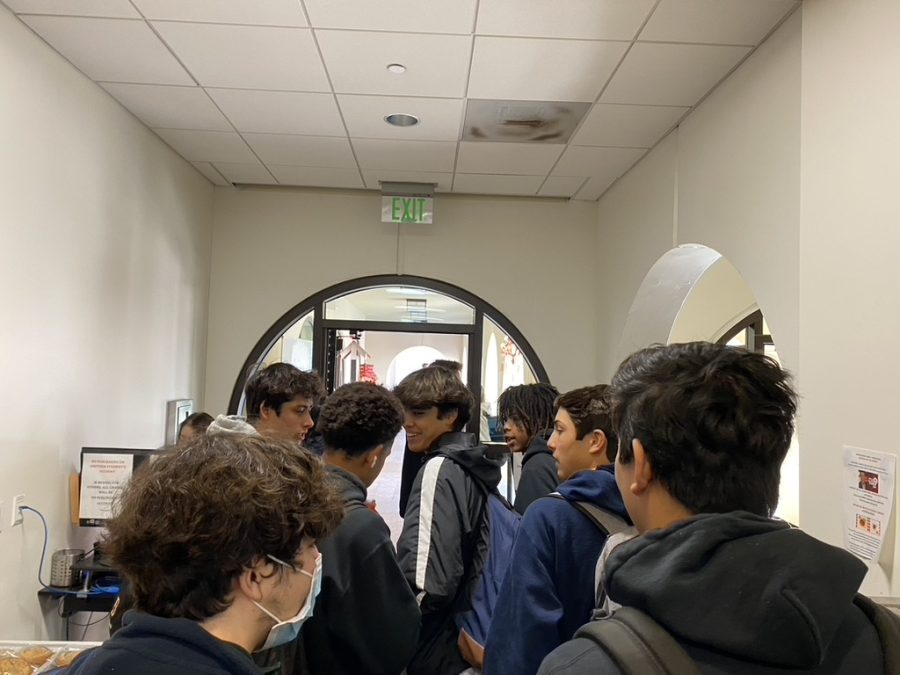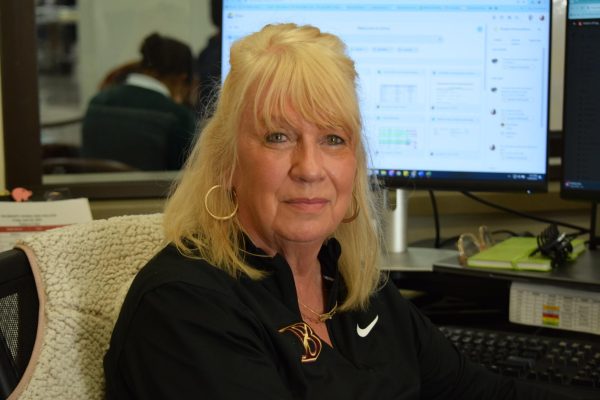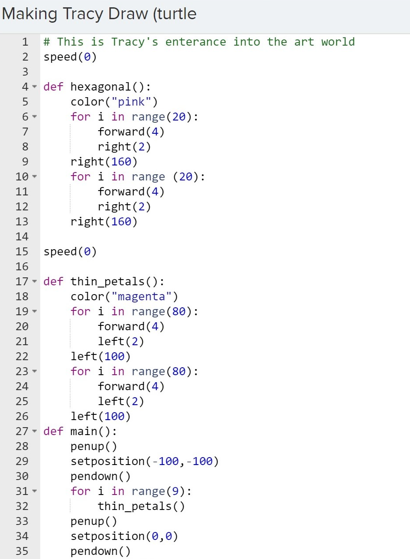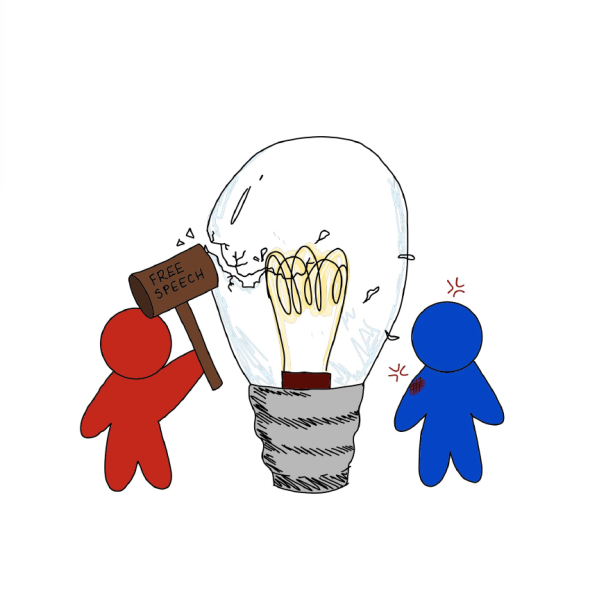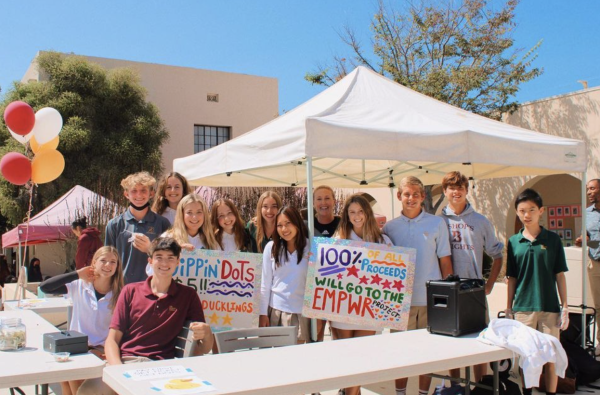Not Breaking for Breakfast
Why students need to pay more attention to breakfast-skipping
Students use milkbreak to get a snack or even to supplement breakfast. The snack bar’s lines are often the most crowded, showing that morning snacks are in high demand.
Do you like your eggs sunny-side up?Or scrambled with a little bit of runnyness? Maybe you don’t even get to think about that. Maybe you don’t eat anything — let alone eggs — in the morning.
Breakfast is known as the most important meal of the day. Registered dietitian Beth Czerwony, explained on the Cleveland Clinic website, “would you start a long road trip in your car with the tank on empty? Think of eating breakfast the same way. You’re asking a lot of your body to get moving using only your reserves,” she said.
Are students treating breakfast as the “most important meal of the day?” Some students, like Madeline Luscomb (‘25) do prioritize breakfast. Learning from her sister who is a nutritionist, she says, “you should always start your morning with a solid protein like eggs or a sausage and a carb to go along with it.”
However, with commutes, busy schedules, and sleeping, breakfast sometimes becomes a student’s last priority. In a recent poll, of 122 student responses, 57.4% said they skip breakfast in the morning. Of those students, 64.7 % said that time was the number one reason why they skip breakfast.
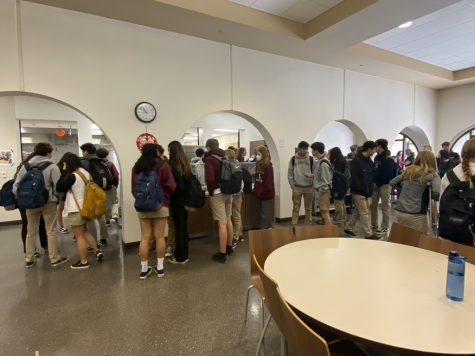
Juniors Sienna Li and Sophia Guan said they favored an extra few minutes of sleep over breakfast. They also noted how they seem to prioritize getting to school on time over eating a good breakfast. “We both take the bus, so we have to wake up earlier,” Sienna said.
So, transportation time can cut into students’ time for a morning meal. Out of the 53 responses from people who are able to eat breakfast, 18.9% said they eat breakfast while traveling to school. Jayla Stafford (‘25) lives 40 minutes away from school. “If I am not up on time, I won’t have enough time to get out of the house by 7:20 if I get food,” she said. She also said that since she usually runs late she grabs a plastic plate and eats in the car. Eliana Leff (‘26) said that she feels that “It is too early to eat before school and I am in too much of a rush.”
Reyn Harmon (‘25), who generally eats breakfast two to three times during the course of the school week, explained, “It depends on how energetic I am when I wake up, sometimes I wake up, it’s still dark outside, and I just want to crawl back in my bed.”
Although skipping a meal or two may not affect you much in the long run, the health effect of continuously choosing to abstain from eating may be larger than most think. In an experiment done by researchers David A Levitsky, Carly R Pacanowski, they found that skipping breakfast resulted in “a net caloric deficit of 408 kcal by the end of the day.” True to that study, Blanche Arnold (‘25) feels that breakfast is essential to her morning routine saying, “I eat breakfast every day [in order] for me to work efficiently at school.”
A lack of energy from an insubstantial breakfast has a major impact on how students operate during the day. Dr. Changzheng Yuan and Dr. Dongmei Yu of Zhejiang University in Hangzhou, China, published a study on the cognitive effect skipping breakfast has in Life Metabolism. Their results showed that “breakfast skipping was associated with significantly worse cognitive function and faster cognitive decline over time.” So not only are there potential health effects from skipping breakfast, but one’s brain cannot function as well. This is especially not great for students whose whole job is to use their brain.
Who’s eat breakfast at 10:00 in the morning? Not me. — Reyn Harmon ('25)
In addition to the irregularity of eating breakfast, the quality of students’ meals may be affected. Students who eat breakfast, but are not necessarily eating the most nutritious foods to start their day with, are also seeing a decrease in the quality of their meals. “I think that I rush a lot of my meals in the morning or I don’t grab enough because I’m rushing,” Jayla said, “I don’t feel fully nourished in the car because I don’t have the option to grab more if I need.”
For students who skip, the lack of a filling, hearty breakfast often results in resorting to other sources for food. This includes milk break and advisory snacks.
Eliana, who struggles to eat breakfast on-time in the morning, opts for the snack bar line. “If I have time I’ll grab something to eat before I leave the house for school, but I usually grab a snack at milk break,” Eliana said. She continued saying that, for her, milk break is a replacement for breakfast.
The large crowded lines-turned-mobs clamoring at the right side of the cafeteria are evidence of the milk break’s popularity — or necessity. The School provides a variety of muffins, breakfast burritos, and other snacks for sale. They also provide cereal and milk.
However, despite the convenience of milk break, not all students agree with this sentiment. Many say that, for high-schoolers especially, milk break comes too late in the schedule for it to be considered breakfast.“Who’s eating breakfast at 10:00 in the morning?” Reyn asked, “Not me.”
Agreeing with that opinion, Jayla noted that milk-break — despite its original intent — felt more like a snack than a replacement for breakfast.
In the past, Director of Food Services Ms. Sara Sweet said that the cafeteria staff had “tried [providing] different healthy options, like fruit cups and yogurt parfaits and even brie and cheese plates. None of those items proved very popular.” It seems that students are choosing to not eat breakfast, something that is unknowingly affecting their productivity. Ms. Sweet added that although breakfast burritos are offered, the snack bar only sells around 30 per day.
Other students resort to advisory snacks and packaged foods like chips. Sydney Mafong (‘26) commented that “often, on weekdays, I eat a quick snack like a granola bar in the car and then rely on chips and Sparkling ICE and other not so healthy food from advisory to energize me until lunch.”
Clearly, these last-minute meals happen when there is a lack of a substantial breakfast in the beginning. But by consciously thinking about breakfast and allotting time in your busy schedule for the meal, maybe we can give breakfast the real importance it’s labeled as. In the end, students must make the choice to eat breakfast. And then maybe someones’ next breakfast won’t be a bag of Doritos from advisory.

Summer is a junior and the Online Editor for The Tower. Previously, she was a story, content, and copy editor. This is her third year on staff and she’s...


